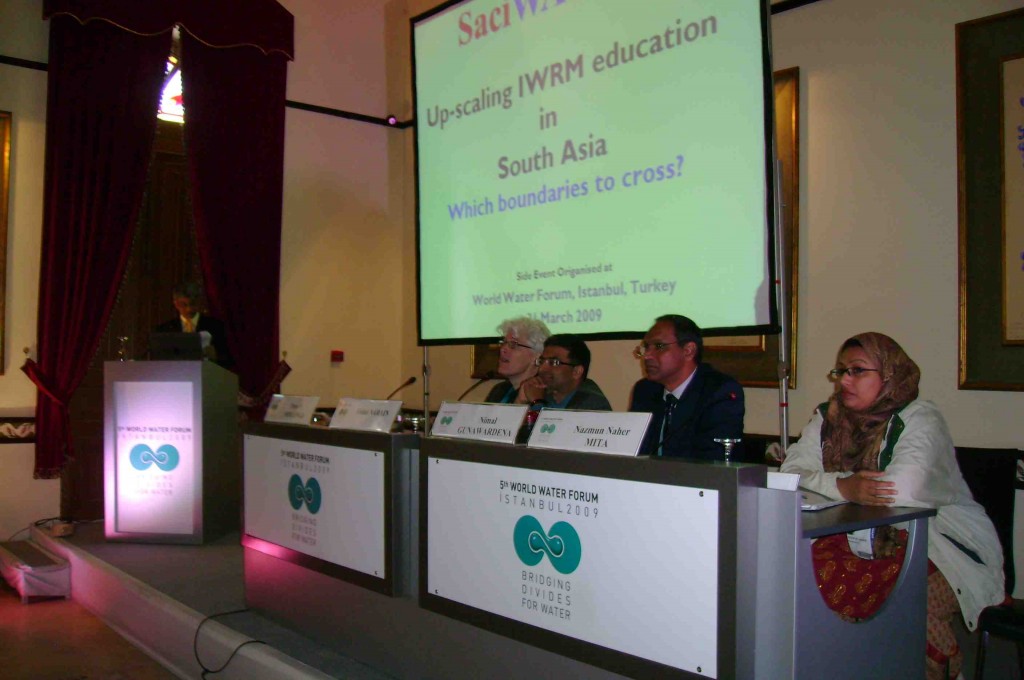Forwarded to the Portal by: Anu Maheshwari, SaciWATERs Image and Content courtesy: SaciWATERs  The side session organized by SaciWATERs, the South Asia Consortium for Interdisciplinary Water Resources Studies, at the World Water Forum 5 called for generating visible demand for interdisciplinary studies on water in South Asia with a focus on creating a cadre of women water professionals to combat the 'masculinity' of current water sector. The side event titled Up-scaling IWRM Education in South Asia: Which boundaries to cross? was organized by SaciWATERs for the Crossing Boundaries Project in Feshane Lale Hall 5 at the World Water Forum 5, Istanbul, Turkey. The session evaluated the current status of water resources education, assess the demand for interdisciplinary water professionals and identify challenges, opportunities, and new initiatives in the realm of higher education for water resources in South Asia through the findings of the study titled "Strengthening IWRM Education in South Asia; Which Boundaries to Cross?". Prof. S Janakarajan, President, SaciWATERs, welcomed the panel members and the session speakers and briefly described the purpose of the Crossing Boundaries Project, an endeavour of SaciWATERs with six partner institutions in four South Asian countries, to bring a paradigm shift in water resources management education in South Asia. Dr. Peter Mollinga, Convener, SaciWATERs, initiated the session by briefing the participants on the objectives of the study which was to review the progress of the Project's initiative and to determine whether higher education system in South Asia was responding to the reforms generated by the Project.
The side session organized by SaciWATERs, the South Asia Consortium for Interdisciplinary Water Resources Studies, at the World Water Forum 5 called for generating visible demand for interdisciplinary studies on water in South Asia with a focus on creating a cadre of women water professionals to combat the 'masculinity' of current water sector. The side event titled Up-scaling IWRM Education in South Asia: Which boundaries to cross? was organized by SaciWATERs for the Crossing Boundaries Project in Feshane Lale Hall 5 at the World Water Forum 5, Istanbul, Turkey. The session evaluated the current status of water resources education, assess the demand for interdisciplinary water professionals and identify challenges, opportunities, and new initiatives in the realm of higher education for water resources in South Asia through the findings of the study titled "Strengthening IWRM Education in South Asia; Which Boundaries to Cross?". Prof. S Janakarajan, President, SaciWATERs, welcomed the panel members and the session speakers and briefly described the purpose of the Crossing Boundaries Project, an endeavour of SaciWATERs with six partner institutions in four South Asian countries, to bring a paradigm shift in water resources management education in South Asia. Dr. Peter Mollinga, Convener, SaciWATERs, initiated the session by briefing the participants on the objectives of the study which was to review the progress of the Project's initiative and to determine whether higher education system in South Asia was responding to the reforms generated by the Project.
Dr. Vishal Narain, Associate Professor, School of Public Policy and Governance, Management Development Institute (MDI), Delhi, further elaborated on the findings of the Study in North India by tracing the changing perceptions of IWRM among water professionals and emphasized the fact that though there is a demand for IWRM water professionals in the Government sector, a visible demand still needs to be created. Dr Nimal Gunawardena, Professor, Post Graduate Institute of Agriculture, Peradeniya, Sri Lanka, and Steering Committee Member, Cap-Net, Sri lanka, followed with a brief presentation on the status of the IWRM Education Programme in the Post Graduate Institute of Agriculture, Peradeniya, Sri Lanka. Ms. Nazmun Naher Mita, South Asia Water (SAWA) Fellow, Masters in IWRM, Institute of Water and Flood Management (IWFM), Bangladesh University of Engineering and Technology (BUET), Dhaka, Bangladesh, shared her personal experience of being one of the first female students to take up the IWRM course in South Asia with the help of SAWA Fellowship provided by the Crossing Boundaries Project. 
Following this, the three panelists, Dr. Shahbaz Khan, Chief, Sustainable Water Resources Development & Management Section, Division of Water Sciences, Natural Sciences Sector, UNESCO, Paris, France, Dr. Paul Taylor, Director, Cap-Net, Pretoria, South Africa, and Dr. Joke Muylwijk, Executive Director, Gender & Water Alliance, The Netherlands, provided their comments and insights on the study. Dr. Khan shared his vision of IWRM programme gaining a stronghold in the higher education sector. However he also expressed his disappointment in the Draft Istanbul Ministerial Statement of the World Water Forum 5, 2009 which he regretfully pointed out, focused on the technical aspect of water management ignoring the socio-cultural constraints of implementing a change. He emphasized the urgent need to press the interdisciplinary approach to water resources management. Dr. Paul Taylor, congratulated SaciWATERs and the partners of the Crossing Boundaries Project for the remarkable progress made in promoting IWRM Education in region and further emphasized the need for capacity building of higher level water professionals. Dr. Joke Muylwijk lauded the report but also pointed out the lack of comprehensive gender-segregated data. The participants of the session followed with various questions and comments on the issues of gender, capacity building of not only technocrats but also of social scientists and extending the programme to other countries of South Asia especially Pakistan. The report can be downloaded as a .doc file here:Up-Scaling IWRM Education in South Asia- Which Boundaries to Cross? Access more World Water Day related news & activities on the India Water Portal Blog here: World Water Forum Updates World Water Day — Event at Madiwala Lake, Bangalore Films on water for World Water Day — Bangalore World Water Day - Open Event by MoWR at New Delhi Event Calendar for World Water Day Events - 2009!
/events/scaling-iwrm-education-south-asia-which-boundaries-cross-event-saciwaters-istanbul